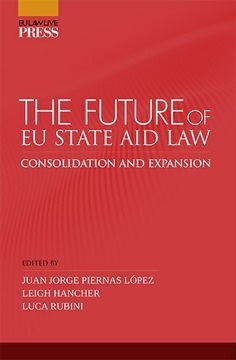| State aid control has been and still is the most unique feature of EU competition policy - a policy area which may offer lessons extending beyond the EU´s boundaries to the various initiatives aiming at regulating the State intervention in the economy at the plurilateral or global level. e goal of this book is to present an analysis of State aid law and policy which does not follow the traditional approach of the now numerous publications in the eld. Some chapters necessarily focus on well-known problematic categories -such as the political economy of State aid control (Buts and Robins), the nature of the definition of aid (see De Cecco, Hancher, Cortese), the compatibility assessment (Buendia-Sierra), or the institutional and constitutional aspects and enforcement (Caranta, De Cecco, Cyndecka, Pastor-Merchante), taxation (Szudoczky), and services of general economic interest (Hogan, Jaeger). Other chapters are devoted to new emerging themes that are shaping the area, such as the "extension" of EU State aid law beyond the territorial constraints of the EU (Rubini, Biondi and Kotsonis, Piernas López), State aid control in times of recurring crises (Ferri, Kyriazis), impact assessment (Barbu-O´Connor, Derenne, Hofmann, Klotz, Vallindas), State aid and activism in relation to the climate crisis (Kleis- Walravens and Delarue), State aid and gender (Finckenberg-Broman and Broman). The terms of references given to the various contributors can be summarised as follows: "think outside the box! Provide a fresh assessment of State aid law and policy. Look at the future". The book shows that the role of the State aid rules within the Treaty architecture has evolved, in line with the evolution of the internal market, yet in the editors´ view, this role should remain closely connected to the avoidance of distortions of competition created by the selective intervention of Member States in the market, favouring certain undertakings or sectors through financial means. |



